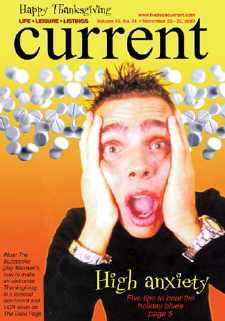According to experts, up to 10 percent of the population experiences some form of holiday depression. The experts often attribute these feelings to stress, pressure and overeating. The National Mental Health Association’s “Other Mental Illness: Holiday Depression and Stress” guide suggests that the gloomy should “keep expectations for the holiday season manageable; leave yesteryear in the past; remember the holiday season does not banish reasons for feeling sad and lonely; enjoy activities that are free; spend time with supportive and caring people; and leave time for yourself,” in order to cope with their depression.
While the Current certainly supports these methods, we thought we’d throw in a few more proactive remedies to help our readers relieve stress, anxiety and overall melancholy during this holiday season.
(Note: The suggestions posited in this article are not necessarily those of the publishers and should be taken with a grain of salt considering that we are neither psychologists nor counselors trained in the art of mental health.) (Further note: If you are on a low-salt diet, you should consult your doctor before listening to any advice about taking things with a grain of salt.)
Alcohol for what ails you
Most how-to-fight-the-holiday-blues articles will tell you to avoid large quantities of alcohol – they claim that excessive drinking may increase feelings of depression. While technically alcohol may be a depressant, anyone who has endured a dry Thanksgiving or Christmas dinner with their dysfunctional family knows that a dry Thanksgiving or Christmas dinner with their dysfunctional family is at least twice as likely to precipitate a bout of depression than quaffing a couple of cocktails. And the health conscious portion of the population can take comfort in the fact that red wine not only makes the turkey taste better, the company seem smarter and the hearth seem warmer, but it is also good for the heart.
Run away from your problems
Those who refuse to pollute their bodies with artificial toxins, but are in search of a similar euphoric sensation, might consider running. The Women’s Multi-Sport Training website defines runner’s high as “a feeling, usually unexpected, of exhilaration and well-being directly associated with vigorous running – apparently related to the secretion of endorphins.” And, not only will these secreting endorphins generate an ecstasy words can not begin to describe, but running will also help allay the feelings of guilt typically associated with second helpings of holiday pie.
Massage
For the more sedentary, massage therapy might be the perfect way to combat the holiday blues. A healing art that’s been around since ancient times, message therapy is said to improve the body’s circulation, increase blood flow, stimulate the nervous system and loosen the muscles. Proponents of the ancient art claim that the therapy can relieve muscle tension, soreness and strain along with insomnia arthritis, bursitis, headaches, digestive problems, stress, anxiety, and, get this, the holiday blues. And gift certificates for massages make a great holiday gift.
Prick me, please
While the idea of sticking tiny needles into your body might seem like it would incite depression rather than relieve it, acupuncture, like massage therapy, is said to have the power to cure almost anything including depression. A component of traditional Chinese medicine, acupuncture involves sticking needles – not the dreaded cold and cruel flu shot needle, but warm congenial needles that are as thin as a single strand of hair – into your body. The process is believed to stimulate blood flow, arouse energy forces that nourish tissue and enhance the body’s overall systems. Worse comes to worse, the experience will leave you with a memorable anecdote for holiday parties.
Prozac nation
If all else fails, you might want to consider Prozac. Thanks to Eli Lilly and Company, the drug’s manufacturers, 20 mg of Prozac a day will swiftly and safely turn a dour disposition into a delightful one. Over 35 million people world wide (including more than 17 million Americans) are currently ingesting pharmacology’s favorite designer drug. But do you really want to get addicted to something? Keep this in mind: side effects may include nausea, diarrhea, headache, nervousness, drowsiness, insomnia, weakness, loss of appetite, tremors, dry mouth, lightheadedness, yawning, rash, decreased sex drive and impotence. Happy Holidays!
